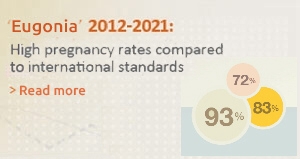Menu
- Our Unit
- Services
- In Vitro Fertilisation (IVF) - Intracytoplasmic Sperm Injection( ICSI)
- Individualised Treatment
- Oocyte Cryopreservation (Fertility Preservation)
- Genetic material donation
- Pre-implatation Genetic diagnosis and screening
- Fertilisation in Natural cycle
- Hysteroscopy - Laparoscopy
- Treatment for Ovarian Hyperstimulation Syndrome
- Infertility investigation
- Semen analysis
- Intrauterine insemination (IUI)
- Blastocyst culture
- Time-lapse technology
- Embryoglue
- Mild ovarian stimulation
- Testicular sperm extraction
- Electroejaculation
- Sperm Cryopreservation
- Embryo Cryopreservation
- Blanc (4)
- Fertility
- IVF
- Faq
- Blog
- Contact
- Menu
-
You are here:
- Home
- Hysteroscopy - Laparoscopy
- Hysteroscopy
- Hysteroscopic surgery
- What is it useful for
Hysteroscopy - Laparoscopy
What is it useful for

Eugonia - Assisted Reproduction Unit
Konstantinou Ventiri 7(HILTON), 11528 Athens
- Email: info@eugonia.com.gr
- Τel.: +30 210 723 6333
- Fax: +30 210 721 3623
About us
- Our Staff
- Our philosophy
- Our history
- Why to choose Eugonia
- Certifications
- Licence
- Our scientific work
- Our scientific publications
- Our Laboratory
- Success rates in ivf
- Our leaflet
- Our facilities and equipment
- Our achievements
- Eugonia in the Media
- Quality policy
- Our Gallery
- Testimonials
- Patient Stories
- Blanc (2)
Services
- In Vitro Fertilisation (IVF) - Intracytoplasmic Sperm Injection( ICSI)
- Individualised Treatment
- Oocyte Cryopreservation (Fertility Preservation)
- Genetic material donation
- Pre-implatation Genetic diagnosis and screening
- Fertilisation in Natural cycle
- Hysteroscopy - Laparoscopy
- Treatment for Ovarian Hyperstimulation Syndrome
- Infertility investigation
- Semen analysis
- Intrauterine insemination (IUI)
- Blastocyst culture
- Time-lapse technology
- Embryoglue
- Mild ovarian stimulation
- Testicular sperm extraction
- Electroejaculation
- Sperm Cryopreservation
- Embryo Cryopreservation
- Blanc (4)





























